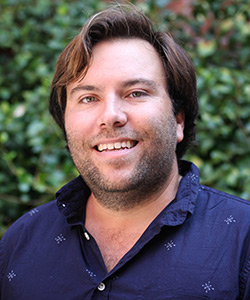 Rory Spence joined Scripps College this fall as an assistant professor of biology, teaching in the neuroscience program and in the W.M. Keck Science Department. His research focuses on the brain’s ability to repair itself after injury or disease. The Office of Marketing and Communications recently interviewed him as part of our ongoing New Faculty Profile series.
Rory Spence joined Scripps College this fall as an assistant professor of biology, teaching in the neuroscience program and in the W.M. Keck Science Department. His research focuses on the brain’s ability to repair itself after injury or disease. The Office of Marketing and Communications recently interviewed him as part of our ongoing New Faculty Profile series.
Scripps College: Recently, you began research to understand how zebrafish are able to completely regenerate their brains after injury. Human brain injury has been in the news quite a bit, especially in regards to Chronic Traumatic Encephalopathy, or CTE, which has been identified, postmortem, in the brains of many NFL football players. Can you tell us more about your research interests as related to concussions and neurologic disorders?
Rory Spence: When humans are subject to neurological insult, they have a limited ability to repair their brains. Zebrafish, which are remarkably genetically similar to humans, are able to completely repair their brains after injury—similar to how a starfish can fully regrow its arm—so we can learn much by studying them at the molecular level.
Often, by the time an adult human with a neurological-related disorder such as multiple sclerosis or Alzheimer’s sees a doctor, the disease has progressed to the point where it’s “too late”—we’re basically trying to treat the end of the disease. When we study zebrafish brain injuries, we can study the disorder at an earlier stage than we can customarily investigate in a human. We can also try to even pretreat the disorder if we want. My hope is that using zebrafish as an animal model can offer us an insight into the earlier stages of disease progression, and we can then apply this knowledge to help people.
SC: What advice would you give students who want to study neuroscience?
RS: Two things: First, there’s an excellent class at Scripps called Foundations of Neuroscience that is taught by five different professors from different backgrounds—students rotate and learn something unique, such as history, philosophy, or molecular, cellular, or cognitive science. Second, you can always stimulate your interest in neuroscience on your own. There are great books out there, such as those written by Oliver Sacks, who made neuroscience accessible to the general public. There are also some excellent Ted Talks on the web. The coolest thing about neuroscience is how much is unknown about the brain itself. The brain is an organ we use in our everyday life, and yet there’s so much we don’t know about it—it’s a huge frontier in science.
SC: Do you have a random fact about yourself that is surprising, or that people don’t know about you, that you’d like to share with us?
RS: I went to culinary school, and I was once a fly fishing guide. Maybe the culinary school experience has some connection to my current scientific interests—when you follow a recipe, you make adjustments to improve that final product. I find myself doing the same thing in science as well.

